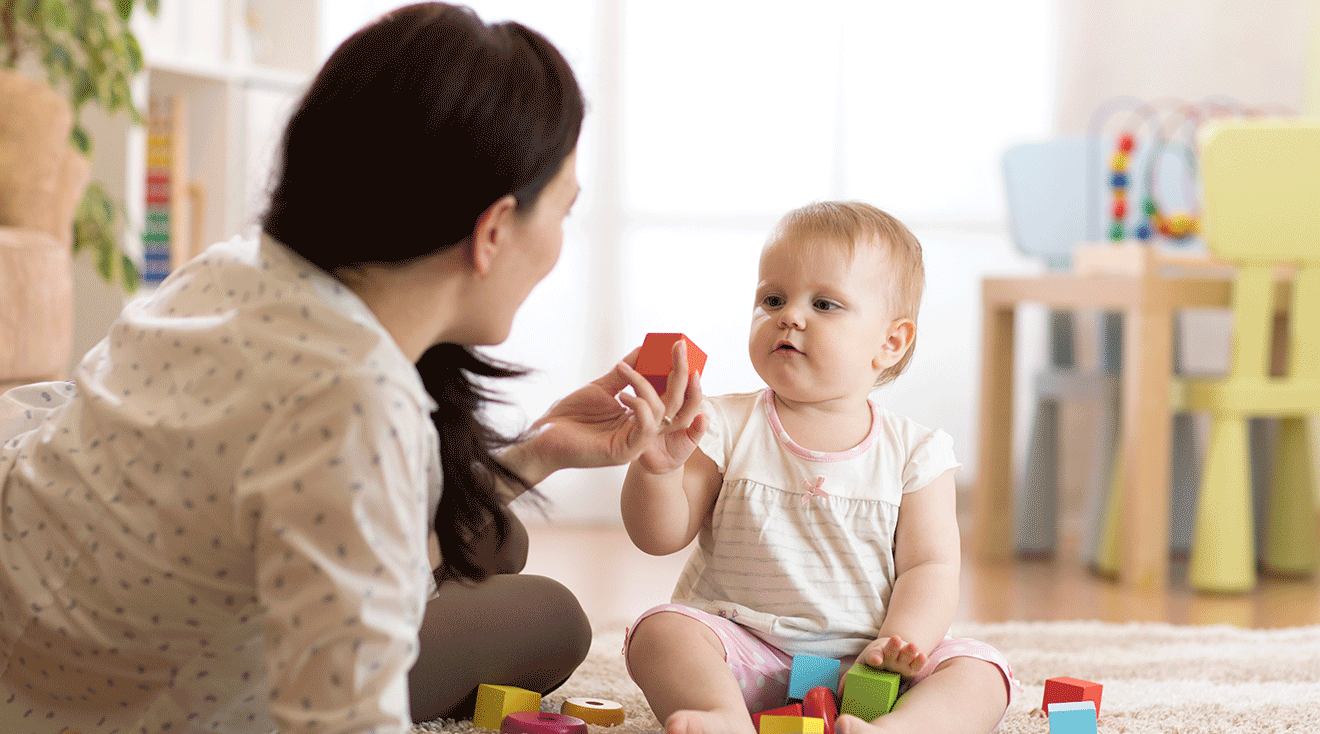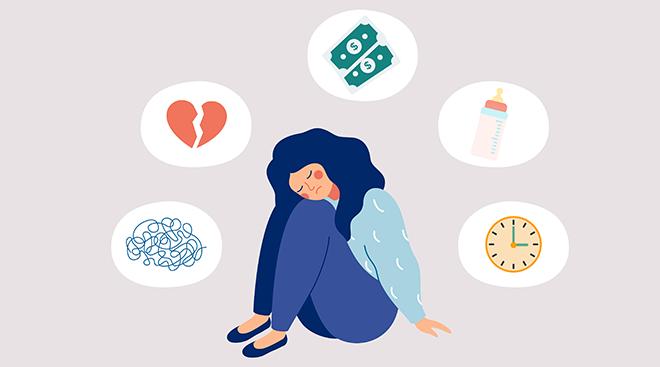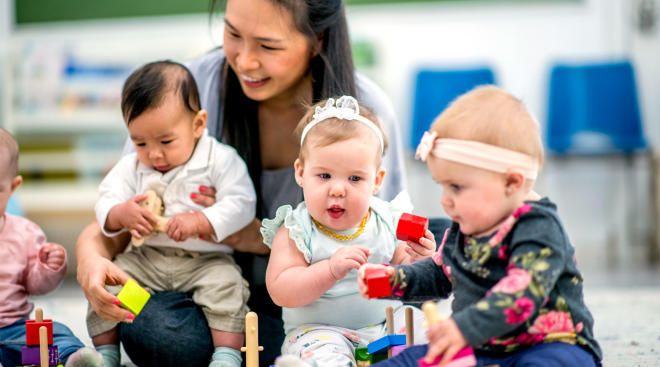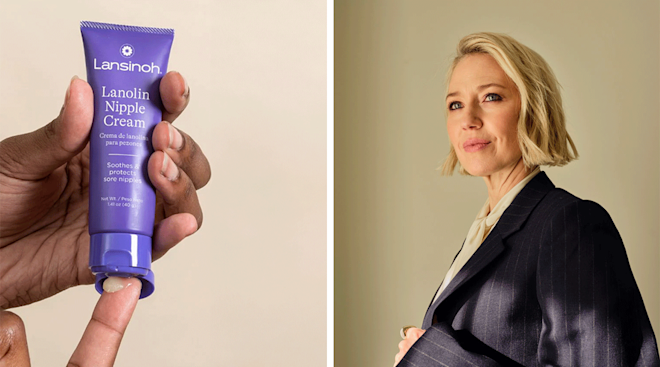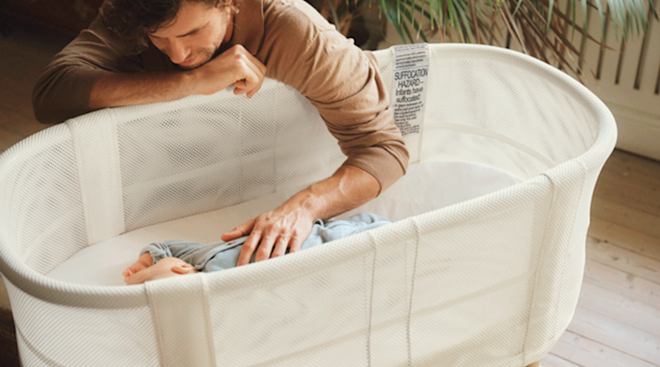Nanny vs. Daycare: Which Is Right for You?
There are many things that are top of mind for modern parents. Chief among them? Childcare. The two most common options are hiring a nanny or enrolling in daycare. But how can you know which one’s the right fit for your family? The truth is that it’s highly subjective, and greatly depends on several factors, including your schedule and finances. To help you decide which option works best for you, we tapped childcare experts to share their top tips and insights. Read on to consider what you need to know choosing between a nanny vs. daycare.
Poll a room full of parents and chances are, you’ll hear some pretty strong opinions on the merits of hiring a nanny. Here’s a secret: While nannies can be invaluable for some households, they aren’t necessarily the right option for every family. When considering daycare vs. nanny care, the best choice depends on the needs of both you and your child—and, of course, the availability of a great nanny or daycare, says Susan Fox, founder of Park Slope Parents, one of largest parenting groups in New York City.
Other factors to consider include your budget, the extent of care needed, whether you work from home and personal preferences, adds Jada Rashawn, a Texas-based nanny and childcare expert. Siblings might also play into the mix here, since childcare can get more logistically challenging (and expensive!) as families grow. But at the end of the day, the experts agree there are pros and cons to every childcare option.
Parents who use a nanny vs. daycare agree that the greatest perks of hiring one include convenience and flexibility. For starters, parents don’t need to worry about adding a school schedule into their already busy routines, as nannies come to your home, which eliminates the need for drop off and pick up. Plus, nannies can work around your family’s unique schedule. This means they can align their work shifts to your day-to-day routine and follow a daily itinerary to precisely meet your child’s specific nap and meal schedule.
Plus, at-home childcare allows littles to be in a familiar and comfortable environment, even when away from their parents. What’s more, a nanny provides one-on-one attention, and can either take your child on outings tailored to their interests, or watch them at home in a familiar setting, which can be comforting to littles struggling with separation anxiety. Another big benefit of hiring a nanny is protecting your child from exposure to germs from other children in daycare settings. Depending on your agreement, a nanny might also help out with household chores—a huge help to many.
Of course, before hiring someone to spend countless hours with your child at your home, you’ll need to compose a job description that outlines your expectations, distribute it and then screen potential candidates for personality, work experience and certifications (like CPR and first aid), Rashawn says. “Look for qualifications that will apply to your family’s needs and environment,” she suggests, adding, “Knowing your non-negotiables helps streamline your search from the get-go.”
She also recommends running a criminal background check and following up with references to get a fuller picture of your lead candidate’s abilities, personality and experience. You might also consider a trial run where you invite a candidate to your house to “practice” caring for your kids while you’re nearby. “It’s a great way for both you and the potential nanny to determine if the arrangement is a good fit for everyone,” Rashawn says. (Keep in mind, you may need to pay the nanny for any trial days or time.) And the screening shouldn’t end after you extend a job offer. “Even after you hire, observe your nanny on the job to ensure they’re meeting expectations, and keep communications frequent to build mutual trust and respect,” Rashawn says.
If this sounds like a lot of work, it’s because it is: Hiring a nanny means promoting yourself to manager, a role that can be quite time consuming, at least during the initial training period. And while nannies can absolutely feel like part of your family, they are, technically speaking, employees. This means they’ll need a contract that outlines their role, responsibilities and payment terms with tax information.
Potential Drawbacks to choosing a nanny
There are a few drawbacks to choosing a nanny. For starters, your nanny’s only taking care of one kiddo, they may have less social interaction with peers their own age. Plus, because nannies are beholden to personal issues like commute delays and illness, they can be less reliable than daycare. Another big consideration can be expense. According to Care.com’s most recent Cost of Care Report, the price of one-on-one care is typically higher than group care. That said, if you have multiple children to account for, hiring a nanny might actually be more cost effective than daycare. Ultimately, the solution that’s most cost effective will boil down to your individual circumstances.
Lastly, for those without a background in human resources, hiring a nanny can be even more laborious than choosing a daycare—and quality control falls entirely on you.
Like hiring a nanny, selecting a daycare can feel like a weighty task. Beyond considering proximity to your home or work and availability, you’ll want to look into price, hours of operation, ratio of children to caretakers, and whether food, diapers and wipes are provided.
According to Rachel Robertson, vice president of education and development for employer-sponsored childcare provider Bright Horizons, one of the best things to do when comparing facilities is to vet staff first. “Teachers are the heart of any high-quality program. They are the ‘care’ in early care and learning,” she says. The best staff, she continues, is made up of experienced teachers who treat children with kindness and respect, receive continuing education and are incentivized to stay with the childcare center, since a revolving door of staff can be disorienting for young children (and is sometimes indicative of a poorly managed center).
You’ll also want to check out the classrooms for cleanliness and organization: “Look for plentiful materials that are in good condition and accessible to children,” says Robertson. “Ideally, there will be a lot of natural and open-ended options (e.g. wooden blocks, fabrics, yard, clay) to inspire creativity and imagination.”
It’s also important to note there are multiple types of daycare facilities. Home daycares, or group family daycares, can feel more individualized and intimate than more established programs, thanks to smaller group sizes, Fox notes. On the other hand, larger programs may offer larger facilities and other perks. Just don’t get too attached to your top choice: Even if you find the perfect daycare, you might be beholden to waitlists since daycare for young children can be in high demand.
Just like families with great nannies, there’s no shortage of happy daycare customers. “Quality child care centers can be a very positive experience for your child,” Robertson says, citing benefits such as socialization and the learning that accompanies it. Exposure to a new environment can be more stimulating for kids (and more peaceful for parents working from home!). Daycare kids make friends, learn to share and take turns, practice listening to others and develop the ability to communicate their needs, she explains. Plus exposure to peers can encourage skills such as self-feeding and even potty training when the time comes.
While daycares can offer a range in how play-based or structured they are, you can typically expect some kind of routine with set meal times, rest times and indoor and outdoor activities—a good thing since predictability helps children feel secure and in control while away from home, Roberston says. Another perk is that daycare may cost less than a nanny—and it includes activities that might otherwise add up as incremental expenses.
Perhaps the most attractive aspect of daycares though, is the reliability. Thanks to set hours, parents don’t have to wonder whether their hired childcare will be on time to take over duties. Moreover, aside from emergency closures, daycares usually don’t need to take unplanned sick or personal days.
Potential drawbacks to choosing daycare
Just as choosing a nanny over daycare has its downsides, daycare presents a few disadvantages. One of them is exposure to germs. Anyone who’s ever heard of the dreaded “daycare drip” knows that sickness is constant and inevitable with group settings.
To that end, daycare settings also involve surrendering an element of control over exactly who interacts with your child throughout the day. Plus, while teachers generally do send parents updates, they may be fewer than what you might get from a nanny, who can be contacted directly, Fox says.
Another potential downside of daycares? Schedules that may differ from your child’s natural rhythm. A daycare center needs to stick to a routine that works for the larger group, Robertson says. This means your child may have to sleep when it’s nap time and eat when it’s snack time, rather than sleeping when they’re tired and eating when they’re hungry.
But one of the biggest drawbacks of daycare? Needing to drop your child off and pick them up on someone else’s schedule. That said, it’s important to note that drop-off and pick-up times can be built into parents’ routines—and may even become a time you look forward to.
Finally, while daycare is often less expensive than a nanny, it ultimately depends on your specific location and circumstance. If you have to send more than one child to daycare at a time, a nanny might actually be the more cost-effective option.
When considering a daycare vs. nanny, don’t forget to also consider other options, like daycare-nanny hybrids, part-time daycare, au pairs and nanny shares. If you’re lucky, you might also be able to enlist a family member to help out on certain days or afternoons.
Considerations for choosing a nanny share
Some families arrange nanny shares to help shoulder private child care costs and solve for socialization. This can involve hiring one nanny to split days of the week or hours of the day with another family, or hiring one nanny to watch kids from multiple families.
Considerations for choosing an au pair
Au pair arrangements involve providing room and board for a young adult from overseas in exchange for up to 45 hours per week of childcare, and depending on your agreement, other child-centric chores such as housekeeping, cooking or carpooling, according to Cultural Care Au Pair. Perks include having help on hand pretty much whenever you need it. And because you’re providing room and board, another big draw is affordability, since au pairs are typically paid a stipend rather than an hourly fee that fluctuates based on the number of children. Of course, one obvious drawback is having a non-family member in your home all the time. Plus, this arrangement isn’t realistic for families who don’t have living quarters to provide.
At the end of the day, finding childcare is a necessity for many modern day families—but it can be hard to figure out exactly what option suits your family best. When it comes to a nanny vs. daycare, you may need to do some research and explore a number of them before making the final call. Remember, “there’s not a one-size-fits all option for families,” says Fox. No matter which option you choose for your children, know we’re all figuring it out together.
Plus, more from The Bump:
Susan Fox, Ph.D, is a mom of two and the founder of Park Slope Parents, one of largest parenting groups in New York City. The group builds community for parents in Brooklyn, New York and serves as a resource for those looking for childcare, medical care providers and more. The group also partners with nonprofits to help provide clothing, cribs, blankets and more child-related items to families in need. Fox earned her doctorate degree in communication from the University of California, Santa Barbara and currently also teaches a graduate class in communication at New York University.
Rachel Robertson is the vice president of education and development for employer-sponsored childcare provider Bright Horizons. Robertson has over 20 years of experience in education. She earned her bachelor’s degree in family social science from the University of Minnesota and her master’s degree in human development from St. Mary’s University. She also has a certificate in early education leadership from Harvard University and is currently pursuing her doctorate degree in education from Northeastern University.
Jada Rashawn is a nanny, content creator and a childcare expert based in San Antonio, Texas. She has over a decade of experience in the childcare industry and has spent the last few years focusing on bringing increased recognition and visibility to the nanny industry. Currently, she uses her expertise and experience to help nannies build their personal childcare brands on social media.
Navigate forward to interact with the calendar and select a date. Press the question mark key to get the keyboard shortcuts for changing dates.

































